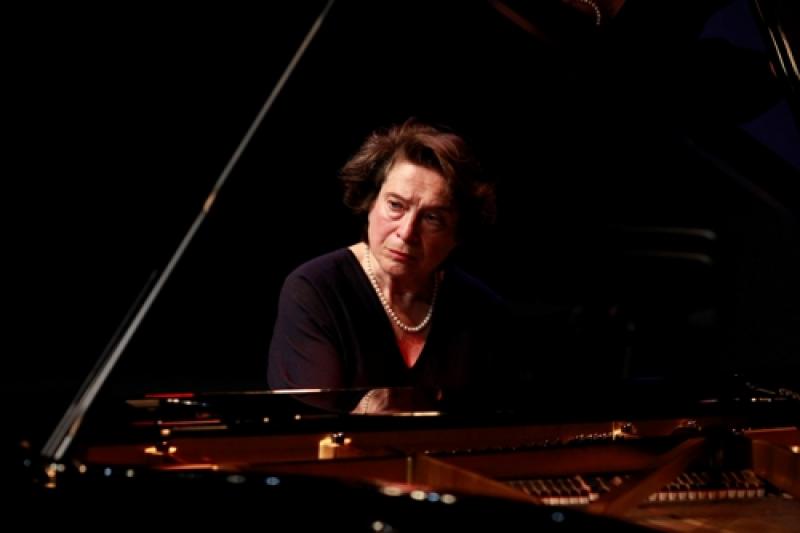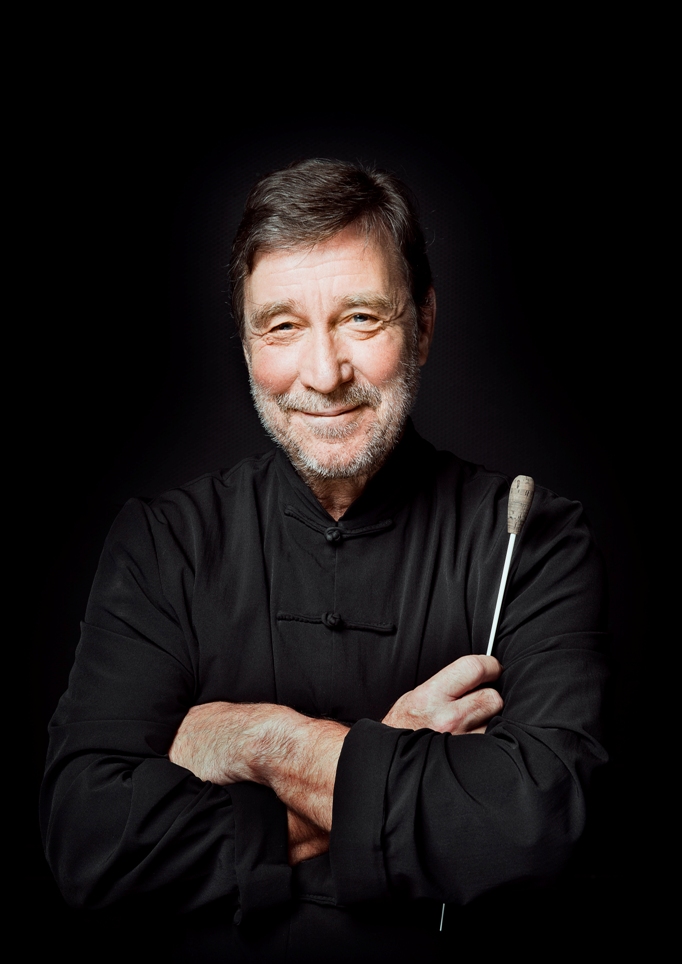Leonskaja, SCO, Kamu, Usher Hall, Edinburgh | reviews, news & interviews
Leonskaja, SCO, Kamu, Usher Hall, Edinburgh
Leonskaja, SCO, Kamu, Usher Hall, Edinburgh
Magisterial partnership triumphantly encompasses two Brahms concertos in one concert

Most pianists never truly master one of Brahms’s two piano concertos, those colossal symphonies for soloist and orchestra, let alone both. To present the two in one concert, then, seems foolhardy – and apparently was when András Schiff went for the marathon at the Edinburgh Festival during the Brian McMaster era. No-one expected anything but true majesty, though, when Elisabeth Leonskaja asked to do the same.
To begin with, it was a splendid reversal of the usual concerto roles where the soloist is spotlit virtuoso while the orchestra and conductor play the supporting role. Under Kamu's seemingly effortless command (the conductor pictured below by Markus Henttonen), the SCO thundered into life, giving us a sense of how shockingly new it must have sounded to puzzled audiences when the 26-year old composer’s D minor giant was first unleashed in 1859, and gleaming, at least from my seat in the Usher Hall, like an especially translucent Berlin Philharmonic. Leonskaja’s entry was predictably grounding, unobtrusively placed, before she glided into introspection and rang out the double octaves in the wild development with surprising but judicious use of the sustaining pedal.
 This is a pianist who always gives effortless space when the phrases need it, but she has surely never had a partnership so fine-tuned to that space, than sense of absolute rightness in tempos and structure which I can only compare to Sir Charles Mackerras’s Mozart (most of it with the SCO, praise be – and Robin Ticciati’s Berlioz with the orchestra is heading in the same direction).
This is a pianist who always gives effortless space when the phrases need it, but she has surely never had a partnership so fine-tuned to that space, than sense of absolute rightness in tempos and structure which I can only compare to Sir Charles Mackerras’s Mozart (most of it with the SCO, praise be – and Robin Ticciati’s Berlioz with the orchestra is heading in the same direction).
Note-perfect in the torrents Leonskaja may not always have been, but nor were Richter, Schnabel or Cortot, giants with whom the pianist in her Indian Summer can be objectively compared. The point is that the passage-work is always directed, purposeful, aware of where the biggest rhetoric lies.
Leonskaja’s uncanniest trick is to roll a whole sequence of virtuoso rippling so evenly that time becomes space. Just when we thought it couldn’t get any deeper, she did just that in perfect league with the SCO’s two superb clarinettists, Maximiliano Martin and William Stafford, in the central stillness of the Second Piano Concerto’s Andante (impossible to judge which of the two slow movements is the greater). You wanted the suspensions to never end, to postpone the return of the great solo cello tune for even longer, though that was superbly taken by Richard Lester. He was the first of the principals to be blessed by Leonskaja, homaging the orchestra with total sincerity, at the end of the concert (and I was glad to see a row of students in the audience as the only standing ovationers, though the applause was deep and sustained).
Equally vital were the complementary horn solos of Alec Frank-Gemmill and Rebecca Hill, the very essence of dark-woods romanticism, along with the low pedal notes of all four horns, never more astonishing. Kamu and Leonskaja between them made the finales anything but simple rondos on a large scale; here they became miracles of unpredictability. I can count perfect concerto partnerships in live performance on the fingers of one hand, but this one goes straight to the top. How about the two big Tchaikovsky concertos next season?
rating
Share this article
Add comment
The future of Arts Journalism
You can stop theartsdesk.com closing!
We urgently need financing to survive. Our fundraising drive has thus far raised £49,000 but we need to reach £100,000 or we will be forced to close. Please contribute here: https://gofund.me/c3f6033d
And if you can forward this information to anyone who might assist, we’d be grateful.

Subscribe to theartsdesk.com
Thank you for continuing to read our work on theartsdesk.com. For unlimited access to every article in its entirety, including our archive of more than 15,000 pieces, we're asking for £5 per month or £40 per year. We feel it's a very good deal, and hope you do too.
To take a subscription now simply click here.
And if you're looking for that extra gift for a friend or family member, why not treat them to a theartsdesk.com gift subscription?
more Classical music
 Robin Holloway: Music's Odyssey review - lessons in composition
Broad and idiosyncratic survey of classical music is insightful but slightly indigestible
Robin Holloway: Music's Odyssey review - lessons in composition
Broad and idiosyncratic survey of classical music is insightful but slightly indigestible
 Classical CDs: Wolf-pelts, clowns and social realism
British ballet scores, 19th century cello works and contemporary piano etudes
Classical CDs: Wolf-pelts, clowns and social realism
British ballet scores, 19th century cello works and contemporary piano etudes
 Bizet in 150th anniversary year: rich and rare French offerings from Palazzetto Bru Zane
Specialists in French romantic music unveil a treasure trove both live and on disc
Bizet in 150th anniversary year: rich and rare French offerings from Palazzetto Bru Zane
Specialists in French romantic music unveil a treasure trove both live and on disc
 Scottish Chamber Orchestra, Ibragimova, Queen’s Hall, Edinburgh review - rarities, novelties and drumrolls
A pity the SCO didn't pick a better showcase for a shining guest artist
Scottish Chamber Orchestra, Ibragimova, Queen’s Hall, Edinburgh review - rarities, novelties and drumrolls
A pity the SCO didn't pick a better showcase for a shining guest artist
 Kilsby, Parkes, Sinfonia of London, Wilson, Barbican review - string things zing and sing in expert hands
British masterpieces for strings plus other-worldly tenor and horn - and a muscular rarity
Kilsby, Parkes, Sinfonia of London, Wilson, Barbican review - string things zing and sing in expert hands
British masterpieces for strings plus other-worldly tenor and horn - and a muscular rarity
 From Historical to Hip-Hop, Classically Black Music Festival, Kings Place review - a cluster of impressive stars for the future
From quasi-Mozartian elegance to the gritty humour of a kitchen inspection
From Historical to Hip-Hop, Classically Black Music Festival, Kings Place review - a cluster of impressive stars for the future
From quasi-Mozartian elegance to the gritty humour of a kitchen inspection
 Shibe, LSO, Adès, Barbican review - gaudy and glorious new music alongside serene Sibelius
Adès’s passion makes persuasive case for the music he loves, both new and old
Shibe, LSO, Adès, Barbican review - gaudy and glorious new music alongside serene Sibelius
Adès’s passion makes persuasive case for the music he loves, both new and old
 Anja Mittermüller, Richard Fu, Wigmore Hall review - a glorious hall debut
The Austrian mezzo shines - at the age of 22
Anja Mittermüller, Richard Fu, Wigmore Hall review - a glorious hall debut
The Austrian mezzo shines - at the age of 22
 First Person: clarinettist Oliver Pashley on the new horizons of The Hermes Experiment's latest album
Compositions by members of this unusual quartet feature for the first time
First Person: clarinettist Oliver Pashley on the new horizons of The Hermes Experiment's latest album
Compositions by members of this unusual quartet feature for the first time
 Gesualdo Passione, Les Arts Florissants, Amala Dior Company, Barbican review - inspired collaboration excavates the music's humanity
At times it was like watching an anarchic religious procession
Gesualdo Passione, Les Arts Florissants, Amala Dior Company, Barbican review - inspired collaboration excavates the music's humanity
At times it was like watching an anarchic religious procession
 Classical CDs: Camels, concrete and cabaret
An influential American composer's 90th birthday box, plus British piano concertos and a father-and-son duo
Classical CDs: Camels, concrete and cabaret
An influential American composer's 90th birthday box, plus British piano concertos and a father-and-son duo
 Cockerham, Manchester Camerata, Sheen, Martin Harris Centre, Manchester review - re-enacting the dawn of modernism
Two UK premieres added to three miniatures from a seminal event of January 1914
Cockerham, Manchester Camerata, Sheen, Martin Harris Centre, Manchester review - re-enacting the dawn of modernism
Two UK premieres added to three miniatures from a seminal event of January 1914

Comments
I can only agree about the
Heartily agree The d minor
Is there any hope of a
Seems I have to speak for the
Seems I have to speak for the not too technically adept folk at the orchestra and report, sadly not.
As for the comments below, I fail to see the difference between the two performances, as I do to note a vast difference in style between the concertos despite the decades between them. There are of course things one does that the other doesn't, but they have nearly equal proportions of thunder and lyricism. That the performance actually went deeper for the Second's slow movement and the unbearable lightness of being in its finale may say more about the works than the performances, which always seemed to serve the music. Personally, I've never heard the SCO sound better. It would be interesting to know what the players thought.